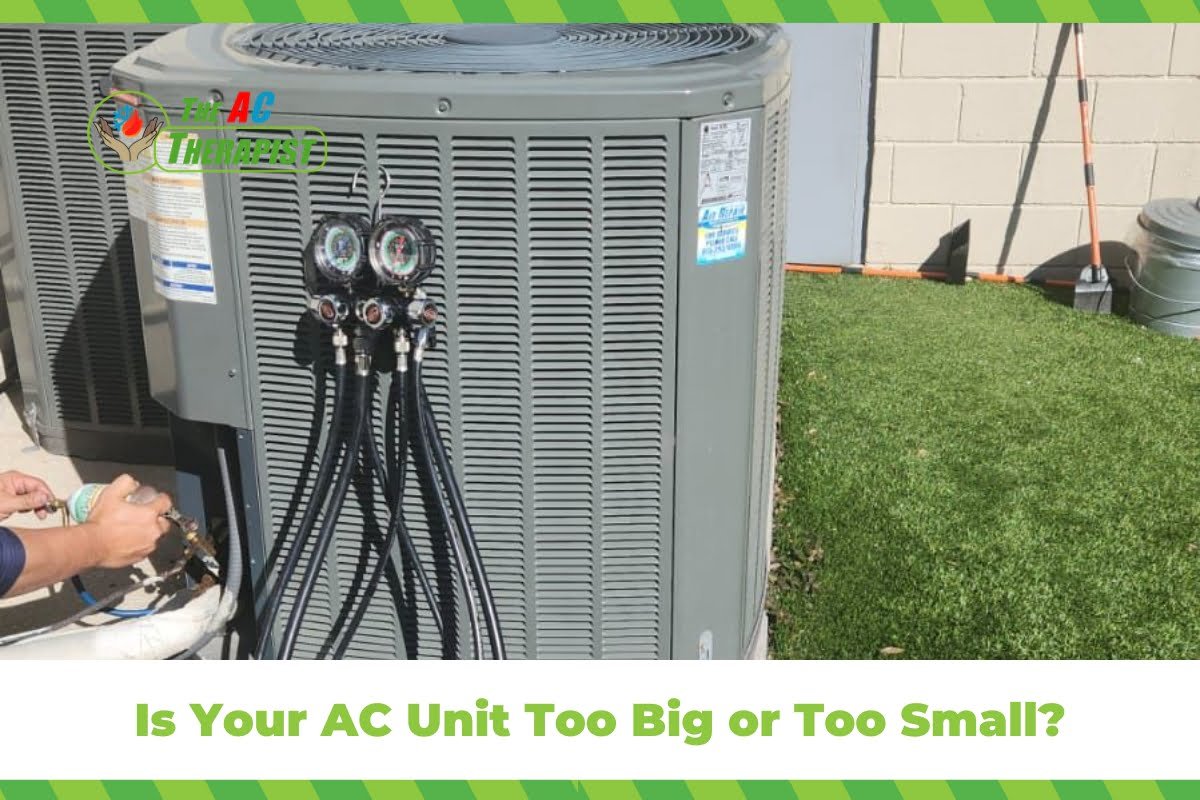Is Your AC Unit Too Big or Too Small?
When it comes to ensuring comfort in your home, especially in areas like Tampa Bay where the climate can be quite demanding, selecting the right air conditioning unit is crucial. Many homeowners often find themselves asking, “Is my AC unit too big or too small for my space?” Understanding the importance of this question can significantly impact not only your comfort but also your energy bills and the longevity of your AC system.
The Importance of Proper Sizing
The importance of proper sizing of an AC unit, especially in regions like Tampa Bay, cannot be overstated. When an air conditioning unit is correctly sized for a space, it ensures efficient operation, comfort, and longevity of the system. Here are some key points highlighting why proper sizing is crucial:
- Efficiency and Energy Savings: An appropriately sized AC unit runs more efficiently. If the unit is too large, it will cycle on and off frequently, failing to reach efficient operation levels and increasing energy costs. Conversely, a unit that is too small will have to work harder to cool the space, also leading to increased energy usage.
- Comfort: Proper sizing directly impacts the comfort level in a home or commercial space. An oversized unit may cool the space quickly but will not effectively remove humidity, leaving the air feeling damp and clammy. A unit that is too small may never adequately cool the space on hotter days.
- Reduced Wear and Tear: When an AC unit is the right size, it experiences less wear and tear because it cycles on and off as it’s designed to. This reduces the frequency of repairs and extends the lifespan of the unit.
- Cost-Effective: While a larger unit might seem like a better option, it can be more expensive to purchase and operate. Similarly, an undersized unit might run constantly, leading to higher utility bills. Proper sizing ensures you are not spending more than necessary on both the unit and its operation.
- Humidity Control: In areas like Tampa Bay, where humidity can be high, proper AC sizing is crucial for humidity control. Oversized units don’t run long enough to effectively remove moisture from the air, while undersized units may not have enough capacity to manage humidity levels adequately.
- Indoor Air Quality: Properly sized units help maintain better air quality. They effectively circulate and filter the air, reducing the potential for mold and mildew growth, which is particularly important in humid climates.
- Compliance with Regulations: Adhering to local building codes and regulations is easier with correctly sized units. These regulations are often in place to ensure energy efficiency and environmental protection.
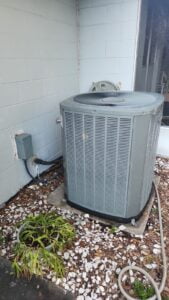
Signs Your AC Unit Might Be Too Big
If your AC unit is too big for your space, it can lead to a range of issues affecting comfort, efficiency, and the longevity of the system. Here are some signs that might indicate your AC unit is oversized:
- Short Cycling: One of the most common signs of an oversized AC unit is short cycling. This means the unit turns on and off more frequently than normal. While it may cool the space quickly, it doesn’t run long enough to effectively remove humidity or circulate air properly, leading to uneven temperatures and discomfort.
- Humidity Problems: An oversized AC unit doesn’t run long enough to adequately remove moisture from the air. This can leave your space feeling damp or clammy. In areas like Tampa Bay, where humidity is already a concern, this can be particularly uncomfortable.
- High Energy Bills: Despite the misconception that a bigger unit will be more efficient, an oversized AC can actually lead to higher energy bills. This is due to the increased energy consumption from the frequent starting and stopping of the unit.
- Temperature Inconsistencies: You might notice that some rooms or areas are cooler than others, or that the temperature fluctuates significantly. This is because the oversized unit is not running long enough to distribute air evenly throughout the space.
- Increased Wear and Tear: The constant cycling on and off puts extra strain on the AC unit, leading to more wear and tear. This can result in more frequent repairs and a shorter lifespan for the unit.
- Noise Issues: An oversized unit can create more noise. Frequent starting and stopping can be disruptive, especially in quieter environments.
- Reduced Comfort: Overall, an oversized AC unit can significantly reduce comfort levels in a space. The inability to properly dehumidify and the uneven cooling can make the environment feel less comfortable, even if the temperature on the thermostat seems appropriate.
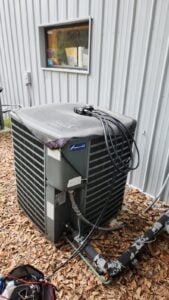
Signs Your AC Unit Might Be Too Small
If your AC unit is too small for your space, it can lead to several issues that affect the comfort, efficiency, and overall effectiveness of your cooling system. Here are some signs that might indicate your AC unit is undersized:
- Constant Running: An undersized AC unit will often run continuously without reaching the desired temperature. This is because it lacks the capacity to cool the space adequately, especially during peak heat periods.
- Inadequate Cooling: If certain areas of your home or business remain warm or don’t cool down sufficiently, even when the AC is running constantly, it could be a sign that the unit is too small to effectively cool the entire space.
- High Energy Bills: While you might expect a smaller unit to use less energy, an undersized AC can lead to higher energy bills. This is because it has to work harder and run longer to try to cool the space, consuming more energy in the process.
- Humidity Issues: Just like an oversized unit, an undersized AC can struggle with humidity control. Because it’s constantly running, it may not effectively remove moisture from the air, leading to a sticky or muggy feeling inside.
- Temperature Fluctuations: If your AC unit is too small, you might experience significant temperature variations. It may never reach the set temperature, or there may be noticeable differences in temperature between different rooms or areas.
- Longer Cooling Times: If it takes a very long time to cool down your space, this could be a sign that your AC unit doesn’t have the capacity to quickly and efficiently lower the temperature.
- Frequent Repairs: An undersized unit is under more strain and may require more frequent repairs due to wear and tear from constant running.
What is the rule of thumb for AC sizes?
The rule of thumb for sizing an air conditioning unit, often used by HVAC professionals, involves calculating the cooling load of a space to determine the appropriate size of the AC unit. This calculation traditionally considers various factors such as square footage, climate, the number and size of windows, insulation levels, and the number of occupants. Here’s a basic guideline:
- Square Footage Method: The most common rule of thumb is to allocate about 20 to 25 BTUs (British Thermal Units) per square foot of living space. For example, a 2,000-square-foot home would require an AC unit with a capacity of approximately 40,000 to 50,000 BTUs.
- Climate Considerations: In hotter and more humid climates, like Tampa Bay, you may need more cooling capacity. This might mean leaning towards the higher end of the BTU range per square foot.
- Room Characteristics: The number of windows, the direction they face, ceiling height, and insulation quality can all impact the cooling requirement. More windows, poor insulation, and higher ceilings typically require a larger capacity AC unit.
- Occupancy and Heat-Generating Appliances: More people and heat-generating appliances in a space can increase the need for a larger AC unit.
- Energy Efficiency: Modern homes with high energy efficiency may require fewer BTUs per square foot compared to older homes.
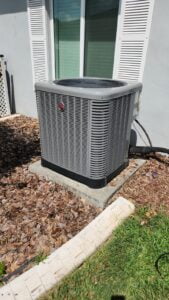
Does the age of your house affect the size of the AC you need?
Yes, the age of your house can indeed affect the size of the air conditioning (AC) unit you need, though it’s one of several factors to consider. Here’s how:
- Insulation Quality: Older homes may have less effective insulation compared to newer ones. Poor insulation means more heat gain in summer and heat loss in winter, requiring a more powerful AC system to maintain comfortable temperatures.
- Air Leaks: Older structures might have more cracks and gaps around doors, windows, and other areas, leading to air leaks. This can increase the load on your AC system as it works harder to compensate for the lost or gained heat.
- Ductwork Condition: In older homes, the ductwork might be outdated or deteriorated, affecting the efficiency of air distribution. This could necessitate a different AC size or additional ductwork repair or replacement.
- Room Layouts and Sizes: Older homes often have different room layouts and sizes than newer constructions. This can influence the airflow and cooling requirements, impacting the size and type of AC system needed.
- Existing HVAC Systems: If your home is older and has an existing HVAC system, its capacity and compatibility with modern systems might influence your choice.
Can the wrong size of your AC unit affect your indoor air quality?
Yes, the wrong-size air conditioning (AC) unit can indeed affect indoor air quality in several ways:
- Humidity Control: One of the key roles of an AC unit is to control humidity levels. An oversized AC unit cools the space quickly but doesn’t run long enough to effectively remove humidity, leading to a damp environment that can promote mold and mildew growth. Conversely, an undersized unit may run continuously without adequately reducing humidity, also contributing to poor indoor air quality.
- Air Filtration: The AC unit’s air filtration system is responsible for removing particulates from the air. If the unit is too large and has shorter run times, it may not circulate and filter the indoor air effectively. On the other hand, an undersized unit that’s constantly running might lead to more frequent filter replacements and potentially reduced filtration effectiveness over time.
- Temperature Fluctuations: An improperly sized AC can cause temperature fluctuations and uneven cooling, which can indirectly impact indoor air quality. For instance, areas of the home that are not adequately cooled may become damp or develop condensation issues.
- Ductwork Compatibility: Especially in older homes, the existing ductwork may not be compatible with a new, incorrectly sized AC unit. This can lead to poor air distribution and increased dust and allergens if the duct system is strained or damaged.
- Overall Comfort: The wrong size unit can impact the overall comfort of the indoor environment, which is a crucial aspect of perceived air quality.
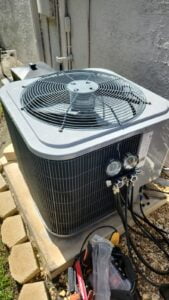
How do I know if your AC unit is the right size?
Determining if your air conditioning (AC) unit is the right size for your space involves several key indicators and calculations. Here’s how you can assess whether your AC unit is appropriately sized:
- Professional Load Calculation: The most accurate way to determine the correct size is through a Manual J load calculation. This calculation considers various factors, including square footage, ceiling height, window size and type, insulation quality, local climate, and more. As an HVAC professional, you can perform this calculation or have it done by a qualified technician.
- Consistent Comfort Levels: A properly sized AC unit should maintain a consistent and comfortable temperature throughout your home. If some rooms are too cold while others are too warm, it might indicate an issue with the size or distribution of your AC system.
- Humidity Levels: The right-sized AC unit should effectively control humidity. If your home feels damp or has a musty odor, it could be a sign that your AC unit is too large and not running long enough to dehumidify the air properly. Conversely, if the air feels too dry, it might be too small and overworking.
- Short Cycling: If your AC unit frequently turns on and off (known as short cycling), it might be too large for your space. Short cycling can lead to increased wear and tear on the system and inefficient operation.
- Energy Bills: Compare your energy bills with similar-sized homes in your area. If your bills are significantly higher, it could be a sign that your AC unit is not the right size or is operating inefficiently.
- Age of the Unit and Performance: Older units may not be as efficient as newer models and might struggle to cool your space effectively. If your unit is old and you’re experiencing comfort issues, it might be time for an assessment or an upgrade.
- Run Time: An AC unit that’s the correct size should run in relatively consistent cycles. An undersized unit might run continuously, struggling to cool the space, while an oversized unit might cool the space too quickly without adequately removing humidity.
Finding the Perfect Fit: Why the Right AC Size Matters and How The AC Therapist Can Help
In conclusion, the importance of having an AC unit that is perfectly tailored to the size of your home cannot be overstated. Whether your unit is too big or too small, the consequences can range from discomfort and poor air quality to increased energy costs and undue strain on your HVAC system. An oversized unit can lead to excessive humidity, mold growth, and short cycling, which not only affects the unit’s efficiency but also its lifespan. On the other hand, an undersized unit will struggle to cool your space adequately, leading to continuous operation, higher energy bills, and an uncomfortably warm home environment.
Understanding the intricacies of AC sizing is not just about square footage; it involves a comprehensive analysis of your home’s layout, insulation quality, window sizes, local climate, and even your family’s specific cooling needs. This is where the expertise of a professional HVAC service becomes invaluable.
The AC Therapist, serving the Tampa Bay area, is your go-to expert for ensuring that your AC unit is just the right fit for your home. Our team of skilled professionals is adept at assessing and addressing a wide array of HVAC concerns. We don’t just stop at determining the right size for your AC unit; we offer a holistic approach to ensure your entire HVAC system is functioning optimally. Our services include AC repair, installation, and maintenance, as well as specialized solutions like mini-split installations, smart thermostat upgrades, and comprehensive HVAC zoning.
Moreover, with our Therapy Maintenance Plans, you can choose a level of service that best suits your needs, ensuring that your system is always running smoothly and efficiently. Whether you opt for the Value, Premium, or Elite plan, you’ll enjoy benefits like regular maintenance visits, discounts on services, and even extras like UV light installation and duct sanitation, depending on your chosen plan.
Remember, a well-sized and well-maintained AC unit is key to not only your comfort but also to the health and air quality of your indoor environment. If you’re experiencing issues with your current AC unit, or if you’re unsure about its size and efficiency, don’t hesitate to reach out to The AC Therapist. We are committed to providing top-notch service and ensuring that your home remains a haven of comfort and efficiency, no matter the season. Contact us today to learn more about how we can help you achieve the perfect climate control in your home.

